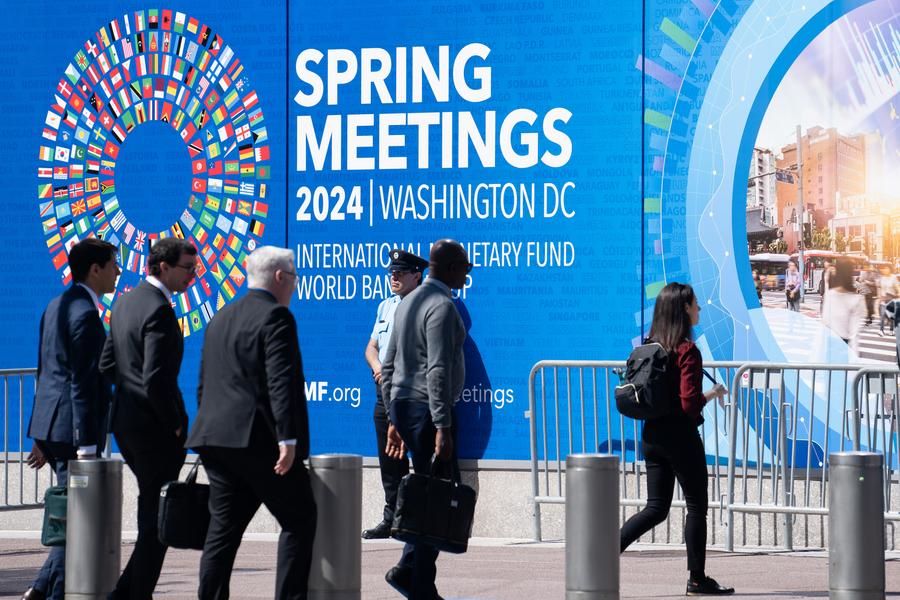Interview: IMF fiscal chief cautions against fiscal expansion in election year, calls for rebuilding buffers
“The current political environment is particularly challenging, because fiscal expansion is dominating the political discourse,” said Vitor Gaspar, director of the IMF’s fiscal affairs department. “In general, you see quite a number of demands for fiscal support and public spending in the political arena.”
by Xiong Maoling, Hu Yousong
WASHINGTON, April 17 (Xinhua) — The International Monetary Fund (IMF)’s fiscal chief has warned that fiscal expansion is dominating the political discourse in the biggest-ever election year, calling for a durable and credible fiscal tightening to safeguard public finances.
“The empirical evidence from the political business cycle shows that governments tend to spend more and tax less in election years,” Vitor Gaspar, director of the IMF’s fiscal affairs department, told Xinhua earlier this week.
According to the IMF’s newly released Fiscal Monitor, in election years, realized deficits are 0.4 percentage points of GDP higher than budgeted.
“The current political environment is particularly challenging, because fiscal expansion is dominating the political discourse,” Gaspar said. “In general, you see quite a number of demands for fiscal support and public spending in the political arena.”
The latest report showed that global public debt edged up to 93 percent of GDP in 2023 and remained 9 percentage points above the pre-pandemic level. Looking ahead, global public debt is projected to approach 100 percent of GDP by the end of the decade.
While modest fiscal tightening is projected over the medium term, it will be insufficient to stabilize public debt in many countries, Gaspar noted.
Under current policies, primary deficits — which exclude interest payment — will remain above debt-stabilizing levels in 2029 in about a third of advanced and emerging market economies and almost a quarter of low-income developing countries.
Higher real interest rates and lower medium-term growth prospects add to debt pressures, said the IMF fiscal chief.
He also noted that for low-income developing countries, scarring from the pandemic has been most significant.
“When we look at the extreme case of low-income developing countries, what we do see is that these countries were not able to extend fiscal support in response to the pandemic crisis and the cost of living crisis to the extent that was possible in advanced economies,” he said.
On public finance management, Gaspar noted that it’s very important to take into account that interest rates are volatile, and “the cost of funding, the availability of funding may fluctuate in ways that can be sudden and unexpected” in some cases.
The report also warned that loose fiscal policy and rising debt levels, in addition to monetary policy tightening, have contributed to the increase in long-term government yields and their heightened volatility in the United States, raising risks elsewhere through interest rate spillovers.
The year 2023 is “particularly remarkable” for the United States in terms of loose fiscal policy, Gaspar said.
“In 2023, the cyclically adjusted primary deficit shifted from 1.9 percent of GDP in 2022 to 5.7 percent of GDP, it was multiplied by almost three during one single year,” he said.
Tackling debt and deficits today helps avoid more painful adjustments later, he said, adding that it would also create budgetary space for priority spending and to deal with future shocks.
“Fiscal tightening would also be important, an important contributor to completing the last mile of disinflation, especially in economies characterized by excess demand,” he said.
For China, the priority should be stable and sustainable growth, said the IMF fiscal chief.
Gaspar said that China should be pushing for innovation and reinforcing the domestic sources of growth, as emphasized in the Two Sessions, which refers to the annual session of China’s National People’s Congress, and the political advisory body meeting.
“By taking fiscal measures that support spending by households – for example, by strengthening social safety nets – China will be able to sustain the adjustment to a new growth model at the same time that it contributes to macroeconomic stability right now,” he said.
He also highlighted the need to address problems in the real estate sector. “So using the significant policy space that China can afford to decisively solve the crisis would also put public finances – in particular at the sub-national level – in a much sounder footing,” he said.
“In our view, China does have policy space,” Gaspar said. ■

